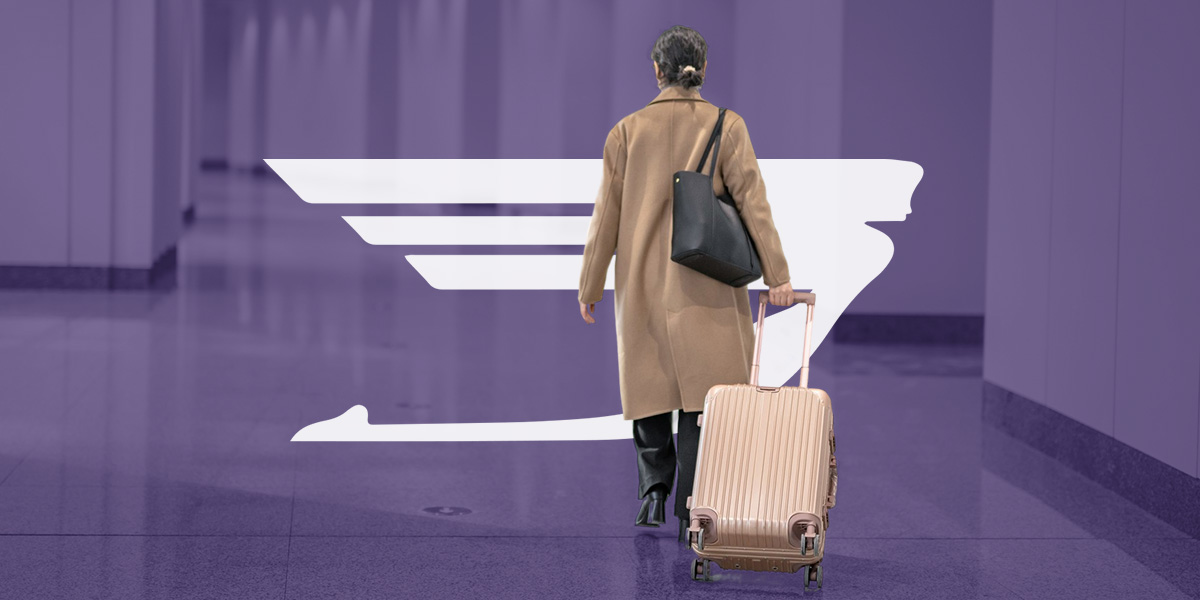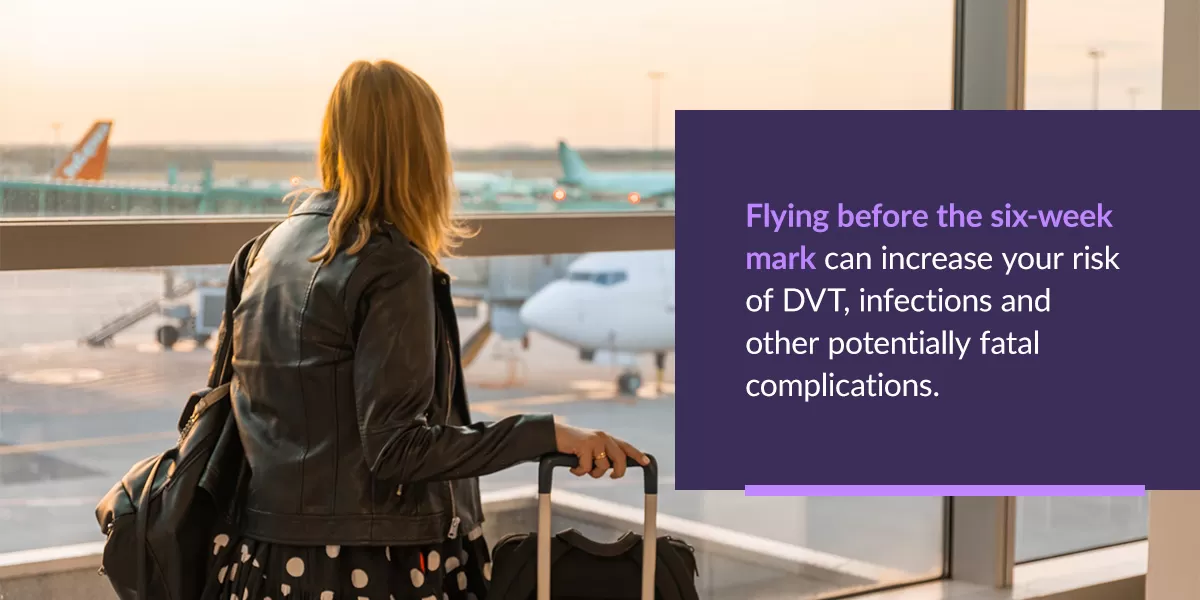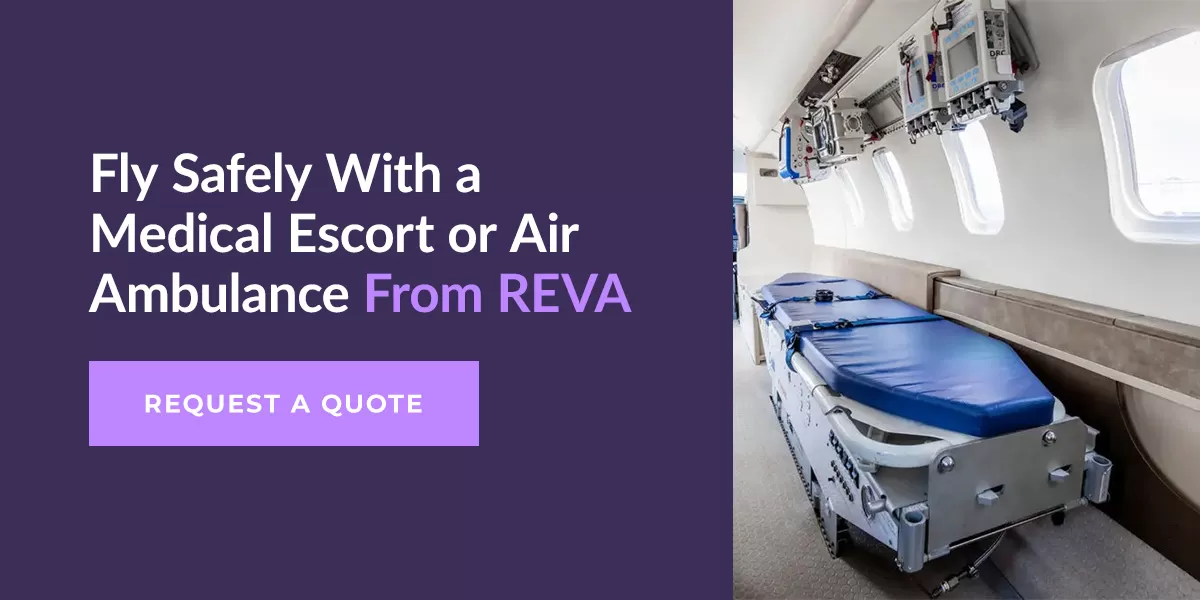How Soon Can You Fly After a Mastectomy?
Breast cancer treatment may involve a mastectomy, a surgery in which one or both breasts are removed to rid the individual’s body of the tumor. While recovery is generally uncomplicated, it’s still a major operation that can be exhausting and painful. If you or a loved one recently had a mastectomy, you may be wondering how soon you can travel on a commercial flight. Traveling before your affected breast, chest and arm area are healed can be very uncomfortable and even lead to health complications.
Depending on your type of mastectomy and general cancer treatment, you may be able to fly within several weeks. However, it’s important to know the risks of flying after a breast cancer operation and your options for arriving at your destination healthy and safe.
What Is a Mastectomy?
A mastectomy is a surgery where a woman’s breast must be removed to prevent or treat breast cancer. A mastectomy might be recommended if a patient has inflammatory breast cancer, a larger tumor or is unable to undergo radiation therapy. The procedure typically consists of making an incision to remove all of the breast tissue and possibly the lymph nodes under the arm. The incision is then closed with stitches or staples.
Many patients who undergo mastectomies will have drains placed to help drain excess fluid from the body and prevent swelling. Some women may also have breast reconstruction during the mastectomy, where their breasts are rebuilt or they get implants, depending on the type of procedure. There are several types of mastectomies, including:
- Simple mastectomy: Also known as a total mastectomy, this is where all breast tissue is completely removed.
- Modified radical mastectomy: All of the breast tissue and the lymph nodes in the armpit are removed on one or both sides of the body.
- Radical mastectomy: The breast tissue, underarm lymph nodes and chest muscle underneath the breasts are removed from the affected parts of the body.
- Skin-sparing mastectomy: The breast tissue, nipple and areola are removed, but the skin of the breast remains intact.
- Nipple-sparing mastectomy: The breast tissue is removed while leaving most of the healthy breast tissue, nipple and areola intact.
- Prophylactic mastectomy: One or both breasts are removed to reduce the risk of developing breast cancer. A prophylactic mastectomy may or may not include preservation of the nipple, areola and skin overlying the breast.
Complications and Risks When Flying After Mastectomy Surgery
As with any major or complex surgery, a breast cancer operation has potential side effects. There are a few things to consider when traveling after a mastectomy, including an increased risk of certain complications, such as:
- Pooling of mostly clotted blood (Hematoma)
- Buildup of fluid in the wound (Seroma)
- Pain, tenderness or infection around the surgical site
- Persistent post-mastectomy pain (PPMP)
- Swelling caused by lymph node removal, causing a disruption in the lymphatic system
- Scar tissue formation
- Phantom breast syndrome
- Numbness in the chest or armpit area
- Limited arm and shoulder movement
- Nerve pain in the chest wall or armpit
- Venous thromboembolism (VTE) or deep vein thrombosis (DVT), a type of VTE
- Blood clots
Traveling, flying or engaging in any strenuous activity before you or your loved one is fully healed may exacerbate these conditions. It’s important to note that patients with cancer who undergo surgery have a significant risk of developing VTE, the most common cause of mortality in cancer patients.
Cancer patients are at increased risk for developing blood clots, which can cause DVT and potentially lead to heart attack, stroke or pulmonary embolism. Long hours of immobilization in a pressurized cabin can also worsen swelling.
How Soon Can You Fly After a Mastectomy?
Because of the increased risk of blood clots and complications after surgery, you’ll likely need to wait a minimum of six to eight weeks before you can fly after your mastectomy. Flying before the six-week mark can increase your risk of DVT, infections and other potentially fatal complications.
This timeline can also be influenced by the airline’s policy for flying after surgery and whether you still have drains in place. Drains are typically removed between one to four weeks after surgery, depending on how much fluid drains daily.
Flying commercially during breast cancer treatment or after a mastectomy may also not be advisable if you:
- Have low platelets or red blood cell count
- Had a stem cell or bone marrow transplant
- Become breathless easily
Tips for Flying After a Breast Cancer Surgery
Traveling by plane may be necessary after a breast cancer surgery like a mastectomy. In these cases, it’s important to take precautions to avoid your risk of health complications. Here are some tips for flying that you can discuss with your doctor:
- Drink plenty of water.
- Keep your skin clean and moisturized.
- Avoid overheating.
- Bring items to keep you cool, such as a portable fan.
- Avoid strenuous activity or overexertion.
- Ask your doctor about medication for preventing blood clots.
- Wear loose, comfortable clothing.
- Use compression socks or stockings to improve circulation.
- Do simple stretches before and after your flight.
- Walk up and down the aisle of the plane when permitted.
- Receive the required vaccinations.
- Carry a first-aid kit.
- Bring your medical records.
- Bring a doctor’s note explaining your diagnosis, medications and medical clearance to fly, if necessary.
- Purchase travel health insurance.
- Bring insect repellent to prevent bites and infection.
What Are Your Options for Traveling After a Mastectomy?
Traveling alone or with a loved one accompanying you can be worrisome, even if it’s been several weeks since your mastectomy. Because post-surgery breast cancer patients are at a higher risk of developing potentially life-threatening complications, it’s always best to be on the safe side. Here are two ways you can travel efficiently and safely after a mastectomy:
- Air ambulance: An air ambulance service acts as a flying critical-care unit for vulnerable cancer and post-surgery patients. If you or your loved one are critically ill or at high risk for a medical emergency, an air ambulance is equipped to provide extensive care. Doctors, paramedics, flight nurses and transport respiratory practitioners are available to transport you safely and respond to your medical needs with efficiency.
- Medical escort: If you or a loved one are further along in your healing journey after a breast cancer operation, you may be able to travel with a medical escort. Also known as a flight nurse, a medical escort will travel with you to your destination and ensure you stay safe and comfortable. Flight nurse and medical escort solutions are ideal for non-emergency situations where a patient needs assistance with specific medical needs and risks.
Why Trust Us for Transport After Your Mastectomy
Whether you or your spouse, parent or relative have undergone a mastectomy, traveling safely is the last thing you should worry about. At REVA, we know that getting to your destination after a major surgery can be stressful. That’s why we’re proud to offer medical escort and air ambulance services. Our medical staff and flight nurses are highly trained and experienced, ready to offer you the highest-quality medical care.
We understand that though flying after a mastectomy operation is not always advisable, it is sometimes necessary. With our medical transportation services, you can have peace of mind that your needs will be taken care of on board, including medication or equipment for your specific condition. Our team will also coordinate your transportation from bedside to bedside, so you can focus on healing without the hassle of booking flights and connecting with medical care once you land.
Fly Safely With a Medical Escort or Air Ambulance From REVA
A mastectomy is a complex surgery with potential high-risk complications. If you or your loved one have recently undergone breast cancer surgery and need to fly, you can trust the experts at REVA. Our air ambulance and medical escort services make it possible for you to fly safely, comfortably and conveniently to any destination.
We offer our services 24 hours a day, 7 days a week, 365 days a year. Whether you require a full critical-care unit and monitoring by our flight medical team or a flight nurse to accompany you on your trip in case of an unexpected situation, we’re here to meet your needs. Request a quote today to see how we can provide quality treatment and constant medical supervision.



